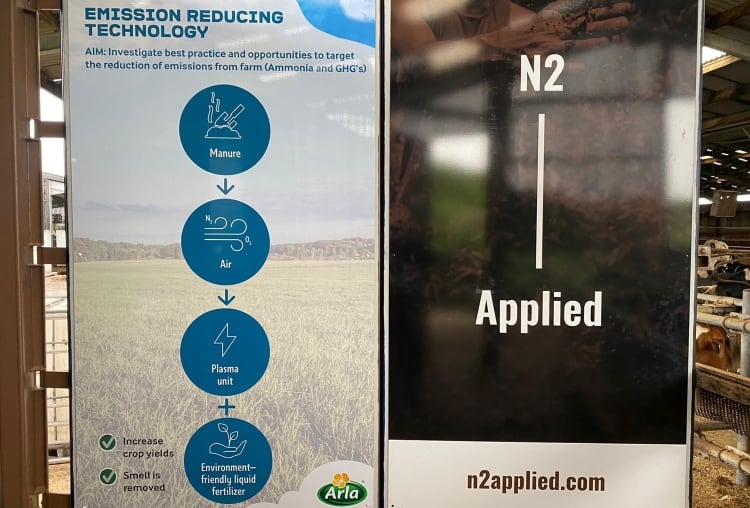The N2 Unit is at the center of a European Union-funded trial at international dairy company Arla Foods’ new Innovation Farm in the UK. Using a scientific technique that applies air and electricity to slurry, the N2 Unit performs a plasma conversion that ‘locks in’ methane and ammonia to the liquid waste material, producing a sustainable fertilizer.
The N2 Unit can eliminate harmful ammonia emissions, which reduce air quality, eliminate greenhouse gas emissions from methane, and can enrich the nutrient content of livestock manure.
The trial is being undertaken as part of Arla’s leading farm standards program, Arla UK 360. It will monitor ammonia emissions and assess the practicalities of this innovative technology within a commercial farm setting. It will aim to generate information on what is needed in order to enable more farmers to be able to implement the equipment on farms.
Earlier this year, Arla shared the output from the first year of its landmark Climate Check program. As part of the insights generated, manure management was highlighted as one of the five main levers that will have a positive effect in supporting the cooperative’s commitment to a 30% reduction of on-farm carbon emissions by 2030.
“2050 is a long way off, but to meet our goals of carbon net zero farming we need to start looking at technologies that can help us now,” said Alice Swift, agriculture director, Arla Foods UK.
“Our Innovation Farm allows us to work with partners like N2 to investigate the feasibility of cutting-edge technology like this on our farmers’ behalf, to see what’s possible and what might be commercially feasible for our farms in the future. This trial shows there is indeed technology out there to help us meet our goals – but we need to find ways of making these work on a practical and affordable level on-farm, which is what this project will explore.”
Plasma-treated fertilizer converted from cow slurry by the N2 Unit was tested for ammonia emissions and nitrogen use efficiency by ADAS, the UK's largest independent provider of agricultural and environmental consultancy, policy advice and research and development. When applied to winter wheat and monitored over the course of a week the plasma-treated material recorded average ammonia emissions reduction of 90%, compared with untreated slurry.
N2 Applied has run multiple trials and pilot projects across nine countries that have shown practical elimination of methane and ammonia emissions and improved grassland yields, as well as the ability to suppress odors from ammonia leakage, and these most recent UK trials further support those findings.
Using a scientific technique that applies air and electricity to slurry, the technology within the N2 Unit ‘locks in’ methane and ammonia to the liquid waste material, producing a sustainable, nitrogen-rich fertilizer. Treated slurry produced on-farm has the potential to reduce the need for chemical fertilizer, and therefore further reduce greenhouse gas emissions.
“This technology has profound implications for the UK’s dairy food sector. If N2 Units were adopted across the UK dairy herd today they could deliver 17 to 21% of the National Farmers’ Union (NFU) emission reduction target for livestock. The ability to cut harmful slurry-based ammonia emissions offers a pathway to practical testing of methane emission reduction, and a giant leap towards the industry becoming net-zero and helping to tackle climate change,” said Carl Hansson, CEO, N2 Applied.
“We have high hopes for the trial, and thank Arla Foods for its collaboration in investigating the potential. While this is the first UK deployment on a farm, others elsewhere in Europe have seen ammonia and methane emissions being greatly reduced, Nitrogen Use Efficiency (NUE) increased and improvements in soil health and crop yield.”
To meet a 2050 net zero carbon target in the UK, the Committee on Climate Change recommended an annual reduction of 18.6m tonnes CO2e from livestock. The National Farmers’ Union has set a target of 11.5m tonnes CO2e per year by 2035.
N2 Applied said one N2 Unit, working on a farm with 200 cows, can reduce and remove a total of 183 tonnes of CO2e per year. Adopted across the UK dairy herd, N2’s technology could reduce and remove 2.42m tonnes CO2e per year – 13% of the Committee on Climate Change recommendation, and 21% of the NFU target.

